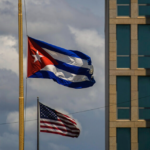
This article was first published in The Hill on July 1, 2023. Click Here to read the original article.
Important historical events often get lost in the daily shuffle. Only last week, news of China building a “military training” facility in Cuba came just a day after Secretary of State Antony Blinken’s brief June 19 meeting with Chinese leader Xi Jinping, which was touted as having stabilized Washington-Beijing relations.
Then President Biden weighed in, opining that Xi had been unaware of Beijing’s spy balloon over the United States, which reflected “a great embarrassment for dictators: when they didn’t know what happened.”
China answered angrily that Biden’s remarks were “extremely absurd and irresponsible”; sent in its Washington ambassador to protest; and read America’s ambassador in Beijing the riot act. Biden himself then said, modestly, that his comments hadn’t had “any real consequence.” Just another episode of Biden inadvertently speaking the truth (although what Xi really knew about the balloon remains unclear).
Of course, an attempted paramilitary coup against Russian President Vladimir Putin is an attention-grabber on any day, but when it comes to China, planning a military facility on Cuba’s north coast is far more important than rhetorical exchanges and uneventful diplomatic visits.
Even before Russia’s drama erupted, coverage of China’s “training” base all but disappeared, lost beneath the most recent example of Biden musings contradicting declared U.S. policy. Originally published by the Wall Street Journal, the “military training” story followed its reporting on China opening a new espionage center in Cuba.
The Biden administration initially denied that story, but then reversed itself, saying the spying base emerged under Donald Trump, likely supported by Huawei and ZTE.
The potential of significant Chinese facilities in Cuba is a red-flag threat to America. After the 1962 Cuban missile crisis, Washington relied on an “implicit understanding” (in Henry Kissinger’s words) with Moscow to reduce threats emanating from Cuba. Under this understanding, the USSR agreed not to place new offensive weapons or delivery systems in Cuba, and the U.S. agreed not to invade Cuba. Although severely tested by Soviet efforts to build a submarine base at Cienfuegos in 1970, the understanding has held. Moreover, in 2002, Russia closed its Lourdes intelligence base, greatly restricting its Cuban collection capabilities.
Between China and America, however, no such modus operandi has ever existed. Beijing made no commitment comparable to Moscow. Moreover, “military training” could well camouflage offensive weapons, delivery systems or other threatening capabilities.
For example, hypersonic cruise missiles, already harder to detect, track, and destroy than ballistic missiles, are natural candidates for installation in Cuba, a prospect we cannot tolerate, along with many other risks, like a Chinese submarine base. Beijing’s interests in Venezuela’s oil-and-gas assets, its support for Venezuelan President Nicolás Maduro’s dictatorship, and its extensive mineral and other investments throughout Latin America could help make Cuba the center for China’s activities across the Hemisphere.
Beijing plainly deals with Havana as though it has no inhibitions. Neither should we. America should move immediately to thwart China’s intrusive ambitions. Revoking diplomatic relations with Cuba; increased economic sanctions against both China and Cuba; and far stricter implementation of existing sanctions, are required now. Although these steps have previously failed to overthrow Castro or his successors, prior measures were never backed, post-1962, by the possibility of using American force against the regime, assuming Moscow adhered to the “implicit understanding.” Moreover, the failed 1961 Bay of Pigs invasion spooked U.S. officials, thereby ending significant planning for Cuban exile participation in regime-change efforts.
That was then. China’s intrusion into Cuba reflects a significant escalation in its hegemonic aspirations, equal to or graver than the 1960s Soviet presence. One thing is certain: We should not stand idly by. Had Presidents Eisenhower or Kennedy acted more forcefully and effectively against Castro, we might have avoided many perilous Cold War crises, sparing us decades of strategic concern, not to mention the repression of Cuba’s people.
As evidence grows that China is prepared to take full advantage of Cuba’s geographic proximity to America, we need to think again about whether and how to overthrow Havana’s post-Castro regime. With Beijing’s threat rising, we should not miss today’s moment without seriously reconsidering how to return this geographically critical island to its own people’s friendlier hands.
Both Havana and Beijing need to understand, without qualification, that they have no license to engage in behavior threatening the United States. We are bound by no commitment limiting our use of force. Just as Nixon properly blocked the Soviets at Cienfuegos, we should examine how to block construction of Chinese military facilities. Guantanamo Bay, for example, was never prepared as a staging ground for anti-Castro activities but remains fully available to us today.
Verbal sparring between Beijing and Washington, or even ominous developments in Russia, should not distract us from critical opportunities to preclude a rising Chinese threat centered in Cuba. If Biden won’t act, Republican candidates in 2024 should make China’s looming Cuba presence a major campaign issue.